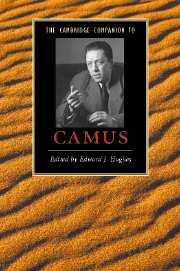Book contents
- Frontmatter
- Introduction
- PART I: BIOGRAPHY AND INFLUENCES
- PART II: THEMES, PREOCCUPATIONS AND GENRES
- 4 Rethinking the Absurd: Le Mythe de Sisyph
- 5 Camus and the theatre
- 6 Camus the journalist
- 7 Camus and social justice
- 8 Violence and ethics in Camus
- 9 Camus and Sartre: the great quarrel
- 10 Portraits of women, visions of Algeria
- PART III: TEXTS AND CONTEXTS
- Postface
- Guide to Further reading
- Index
- Series List
4 - Rethinking the Absurd: Le Mythe de Sisyph
from PART II: - THEMES, PREOCCUPATIONS AND GENRES
Published online by Cambridge University Press: 28 September 2007
- Frontmatter
- Introduction
- PART I: BIOGRAPHY AND INFLUENCES
- PART II: THEMES, PREOCCUPATIONS AND GENRES
- 4 Rethinking the Absurd: Le Mythe de Sisyph
- 5 Camus and the theatre
- 6 Camus the journalist
- 7 Camus and social justice
- 8 Violence and ethics in Camus
- 9 Camus and Sartre: the great quarrel
- 10 Portraits of women, visions of Algeria
- PART III: TEXTS AND CONTEXTS
- Postface
- Guide to Further reading
- Index
- Series List
Summary
Pour toujours, je seraiétranger à moi-même.
(Le Mythe de Sisyphe, Ess, 111)For ever I shall be a stranger to myself.
(MS, 18)After fifteen years I have progressed beyond several of the positions which are set down here; but I have remained faithful, it seems to me, to the exigency which promoted them. This book is in a certain sense the most personal of those I have published in America.
(MS, vi)History and resistance
Le Mythe de Sisyphe may be the most historically dated of Albert Camus's major texts, the work most clearly marked by the conditions under which it was written and thus the one that might appear to have aged the least well and have the least to say to modern-day readers. The essay was written during what Camus in his 1955 preface to its American translation calls 'the French and European disaster' (MS, v), and it is difficult not to relate its sense of tragic hopelessness to France's ignominious defeat at the hands of Nazi Germany, the Occupation and Vichy collaboration. The text that Camus also calls 'the most personal of those (he has) published in America' (MS, vi) could also be read as a reflection of his own struggle with tuberculosis during this period, since he was so seriously ill he expressed doubts at times that he would survive. But perhaps even more than these historical and personal factors Le Mythe may be dated by the concept of the Absurd itself to which Camus's name is still linked today, even though he admitted as early as 1955 that he had already 'progressed beyond' (MS, vi) its propositions. The postwar generation in general quickly moved beyond the Absurd as well, which is why its interest today could be considered largely historical.
- Type
- Chapter
- Information
- The Cambridge Companion to Camus , pp. 53 - 66Publisher: Cambridge University PressPrint publication year: 2007
- 8
- Cited by

